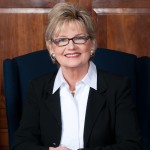By Jorea Marple, Ed.D.
 “We hold these truths to be self-evident, that all men are created equal, that they are endowed by their Creator with certain unalienable Rights, that among these are Life, Liberty and the pursuit of Happiness.”
“We hold these truths to be self-evident, that all men are created equal, that they are endowed by their Creator with certain unalienable Rights, that among these are Life, Liberty and the pursuit of Happiness.”
These words in the Declaration of Independence provide the foundation for our country as well as our educational system. We have traveled a long journey of educational change to realize this powerful ideal. In 2012, we must continue to evolve if today’s generation of schoolchildren is to succeed in the 21st century. Now is the time we must move from educating all students to educating each student.
In West Virginia, we are working to meet this challenge by personalizing learning. The ideas embedded in personalization are about improving and refining practice so we can achieve our aspirations for students, the same that’s been done each time our nation has taken a major step in expanding opportunity.
Personalized learning empowers teachers to provide all students with an education tailored to their specific learning needs, interests and aptitudes without diminishing the importance of core subjects. This approach requires students to take greater responsibility for their own learning and builds upon individual strengths and achievements so that children want to come to school to discover what they are good at, not be discouraged because the limited curriculum only tells them what they can’t do well. Such emphasis on educating the whole child will better prepare our children for college and career success.
In West Virginia, we are working together to transform schools into places where kids want to be. We are doing this by maintaining a steadfast focus on three rigorous goals of the West Virginia Board of Education. The board goals, which can be found at http://wvde.state.wv.us/boardgoals, are clear and rigorous and address what we want student to know, how we want them to behave and what we want them to achieve.
One way we are implementing these goals is by adopting the West Virginia Next Generation Content Standards and Objectives (CSO) (https://wvde.state.wv.us/next-generation/). Next Generation CSOs are what we are calling the Common Core Curriculum in our state. These standards build upon our efforts to incorporate rigor and 21st century learning skills into our classrooms to define the knowledge and skills students need to become college- and career-ready.
In every classroom at every programmatic level, we must be clear in our expectations for students as well as what they want to achieve for themselves. That’s why personalized learning works. It’s one of the best ways we can achieve the board’s goals and our collective purpose of developing “Good kids doing great work.”
We are working to personalize learning through our Innovation Zones. In 2009, the West Virginia Legislature passed The School Innovation Zones Act as an opportunity for schools to apply for funding to support their ability to use creative and innovative ways to improve student learning.
As a recipient of two West Virginia Board of Education Innovation Zone grants, North Marion High School has taken student voice and personalization to a whole new level. Through student forums and surveys, the teachers of North Marion obtained the data needed to positively affect student attendance, dropout and course failure rates.
Students are actively engaged in learning through relevant real-world scenarios that embed multiple subject areas and are infused with technology. Collaborative teacher and student teams work with a large group of community members to ensure students are obtaining the skills necessary to succeed in the work force. North Marion High School Principal Rusty Devito says students and teachers are now eager to come to school and everyone can truly feel and see the difference throughout the building.
We also are embracing the concept of learning anytime, anywhere with our Learn21 Web site (www.learn21wv.com). The site offers students and parents learning resources that can be accessed 24 hours a day, seven days a week. The site, which includes grade specific information from preschool through grade 12 in multiple subjects, engages students on their terms via Internet-ready devices regardless of location.
We also have a decade of experience operating the West Virginia Virtual School, which helps bridge the barriers of time, distance and inequities. The virtual school provides high quality courses delivered via technology and promotes efficacy and equity in course offerings. In West Virginia this becomes vital because of our topography, equity issues and teacher shortage in some areas. During the last school year, the West Virginia Virtual School enrolled students in 716 courses, serving all districts.
Another way West Virginia is working to personalize learning is through its career technical education (CTE) offerings. CTE personalizes learning by offering more than 120 concentrations that allow students to study, gain an industry certification and earn college credit associated with their career choices. In addition, there are seven career and technical student organizations that allow students to serve as leaders, compete with other students across the state and nation and participate in community service.
At schools across West Virginia, teachers also are embracing project-based learning as one way to incorporate real-world applications into their lessons and better engage students in learning. In Gretchen Shaffer’s classroom at Morgantown High School, for example, students use advanced math techniques to learn about buying a car, among other applications. From algebra to advanced calculus, she helps students through problem solving to see how math affects their lives on a daily basis.
Such real world experiences motivate students to learn and prepare them for deeper levels of scientific investigation and understanding. Research tells us that students are more likely to retain the knowledge gained through project learning far more readily than through traditional learning.
Personalized learning is a primary focus of the early years of schooling for children in West Virginia. Children in pre-K through third grade are provided numerous opportunities daily where they can engage in meaningful, active experiences that heighten learning. Research tells us that the earliest years of a child’s life are the most critical for forming positive ideas about school and learning, making it imperative that educators provide an environment conducive for children to explore, experiment and examine through inquiry-based learning as well as other approaches to learning.
Many students, perhaps without realizing it, are already eagerly seeking out ways to personalize learning, according to the recent report “Mapping a Personalized Learning Journey: K-12 Students and Parents Connect the Dots with Digital Learning.” The report, by the California-based nonprofit education group Project Tomorrow, explores how students want to take control of their learning and the tools they use to learn.
“Looking to address what they perceive as deficiencies in classroom experiences, students are turning to online classes to study topics that pique their intellectual curiosity, to message and discussion boards to explore new ideas about their world or to online collaboration tools to share their expertise with other students they don’t even know,” the report found. “Students now expect in their learning lives the same types of personalized interactions that adults already experience in our everyday lives.”
It’s no wonder the report made such a conclusion. Today’s learner is part of a generation that has never known a world without the Internet, without computers, without video games and without cell phones. They thrive in digital-rich environments that allow for greater individualization. Their aptitudes, attitudes, expectations and learning styles reflect the stimulating environment in which they live. They are fundamentally different from previous generations in the way they think, absorb information and communicate. As educators we have to adapt our teaching approach to this ever evolving student.
For more than a decade, the conversations have been about leaving no child behind with teachers analyzing data to develop better instructional strategies. This approach has all too often resulted in teachers teaching to the test. While this one-size-fits-all approach may have improved test scores in some instances, motivation and engagement have plummeted.
To expect a school system to satisfy the interests and passions of all students with one static approach is unrealistic and short-sighted. Students come in all shapes, sizes and learning abilities. Schools cannot provide a beneficial experience for all with a silo approach. All students deserve a first-rate holistic education personalized to meet their own learning needs. When educators across West Virginia complete the adoption of this approach in their schools, I am confident we will be well on our way to creating “Good kids doing great work.”
About the Author
 Jorea Marple took over as West Virginia’s 27th state superintendent of schools March 2011.
Jorea Marple took over as West Virginia’s 27th state superintendent of schools March 2011.
As superintendent, Marple oversees West Virginia’s public school system, which includes 55 individual school districts and serves approximately 282,000 students in preschool through 12th grade. Marple, who has a doctorate in education administration from West Virginia University (WVU), has more than 35 years of experience as a classroom teacher, reading specialist, university instructor, principal, assistant county superintendent, county superintendent, assistant state superintendent and deputy state superintendent. She earned her bachelor’s degree in elementary education at Fairmont State University and a Master of Arts in reading from WVU. She is also a published author on effective school leadership. You may reach the superintendent by e-mail at dvermill@access.k12.wv.us.









